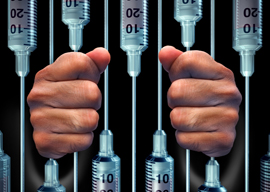
February 27, 2016

Source: Bigstock
These days there is a lot of monomania about. But then perhaps there always was. Speaking for myself, I am a serial monomaniac. I become obsessed for a short time by a subject and then drop it and do not return to it. Once I nearly drove my wife mad with Le Corbusier, the abominable Franco-Swiss architect and town planner who wrote as much as he designed buildings and cities. As one would expect from his architecture, he wrote the most appalling, nasty, and stupid drivel, which I read for about two months, and by far the most interesting question about his career is why anyone should ever have taken him seriously. Anyhow, quotations from Le Corbusier (I was writing an article about him) nearly caused my wife a nervous breakdown, and to this day she cannot bear to hear his name mentioned, just as to this day I can”t bear to drink whiskey because when I was nineteen I drank more than half a bottle of it to look old and sophisticated, with the most awful consequences (for me, that is).
As rational beings we should concern ourselves with matters in proportion to their importance. Unfortunately, nothing is important or unimportant, but thinking makes it so, and there is therefore no possibility of us ever being rational beings. It is not surprising that people who consider themselves wholly rational are often subject to the most bizarre passions.
Still (and I don”t mind if people think I”m being sentimental), I can”t help but think that the unnecessary death of between 100,000 and 200,000 people is important and that it is distinctly odd that it has not made headlines more often than it has.
Is there a war somewhere in the world, you ask, that somehow I have missed? No, it is the number of people since the turn of the century in the United States who have died of overdoses of opiate and opioid drugs. This raises the deep philosophical question as to whether there can be a scandal without anybody being scandalized. But that is not my subject now.
Apart from their accelerating number, the interesting thing about these deaths is that a very large proportion of them are caused by perfectly legal and legally prescribed medication. (In order to head off pharmacological pedants, I should say that these deaths are associated with rather than indubitably caused by opiates and opioids, because most people who take overdoses of them have also taken other substances that may have contributed to the fatal outcome. The overdosage of opiates or opioids may thus be a necessary rather than a sufficient cause of death.) The fact that so many people have died of legally prescribed drugs of addiction suggests that not all the harm caused by illicit drugs of addiction arises from their illegality, as has sometimes been suggested.
Anyhow, the question is, as always, who is to blame? Social problems are not much fun to think about unless you can find someone to blame for them, someone upon whom to fix your spite and rancor. And the answer is…well, quite a lot of people, really.
First there are the patients themselves. One should not speak ill of the dead, of course, but truth compels us to admit that sometimes they were not the finest flowers of humanity. And it is they, after all, who took the overdoses, either accidentally or deliberately. They knew what they were doing.
Moreover, some of them had either intimidated or blackmailed their doctors into prescribing the drugs for them, when in a large number of cases they, the drugs, were not indicated in the first place. For doctors dependent on patients” fees, the threat of withdrawal of custom may act as an incentive to prescribe. Patients may become threatening. There are also reliable reports of doctors prescribing for a fee without any medical indication whatever.
But doctors may prescribe wrongly for no ulterior motive. I am sure that I must have done so many times in my career. Research showed that patients prescribed opiates or opioids in hospital to control pain after operations never, or only very rarely, became addicted to those drugs, from which it was concluded, rashly, that there would be no danger of addiction or misuse if they were prescribed outside hospital to people with chronic pain or discomfort. That the two groups of patients”postoperative and those with chronic pain”were dissimilar seems not to have been appreciated. But we live in an age that is ideologically intent upon disregarding relevant differences.